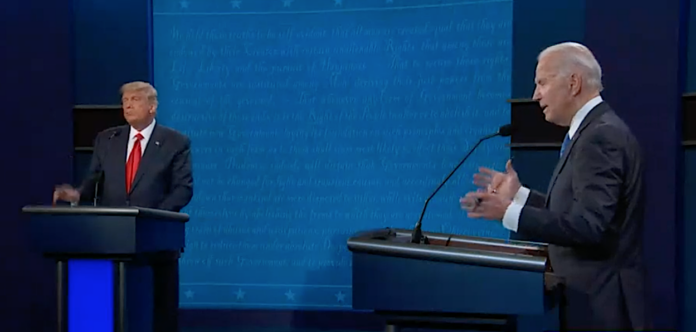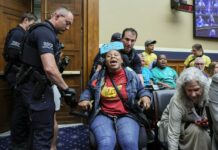
(Georgia Recorder) — Georgia is set to host a presidential preference primary on Tuesday that is trending toward President Joe Biden and Donald Trump securing enough delegates for a rematch of their 2020 presidential race.
As Georgia’s two-week early voting period ended on Friday, more than 436,000 ballots were cast statewide, a trending to a notable decline from 2016 and 2020 presidential preference primaries, when a more competitive earlier Super Tuesday primary and then pandemic-related delays led to more than four million Georgians filling out ballots for their top presidential candidates in the primaries.
Georgia’s early voting turnout for the 2024 preference primary represents a two-thirds decline from 2020. The statewide early voting turnout of 6.3% through Friday was similar to the 7% of Paulding County voters who’ve already voted in person or by absentee ballot.
Paulding County Election Supervisor Deidre Holden said she expects a 25%-30% turnout by the time polls close on Tuesday, lower than the 43% in the March 2016 presidential preference primary and 32% total turnout in 2020.
Trump’s second time as the outside challenger for the Republican presidential nominee has been significantly less competitive than his first bid in 2016. Last week, Trump’s stiffest remaining primary rival, former South Carolina Gov. Nikki Haley, joined a long list of candidates unable to secure more than a fraction of the former president’s support of GOP voters.
During Trump’s first presidential bid in 2016, more than 1.3 million Georgians submitted ballots in a Republican primary that would result in Trump earning 39% of total votes, outpacing U.S. Sens. Marco Rubio and Ted Cruz, who received 25% and 24%, respectively.
Holden said she thinks the lack of candidates in the 2024 presidential primary is a major factor in why more people are not showing up at the polls and turning in absentee ballots. A field of 11 candidates has dwindled, and there are only two remaining Democratic challenges to Biden. She expects much more interest from voters in the Nov. 5 general election, which will also feature statewide races for Congress and the Georgia General Assembly.
“I feel that voters know what the outcome is going to be and they will wait until November to cast their vote for president,” Holden said. “I feel that we will have a good turnout for November due to it being a presidential year as well as the state and local races that will be on the ballot.”
In 2020, Georgia’s March 24 presidential primary was delayed until June as election officials and voters adjusted to a public health emergency that would lead to a record number of absentee ballots cast throughout the 2020 cycle.
In the 2020 primary, Georgia helped Biden widen his delegates lead by receiving 922,327 votes, or 85%, compared to 9% for Vermont U.S. Sen. Bernie Sanders and Massachusetts U.S. Sen. Elizabeth Warren, who tallied the remaining 6%.
Politicians are watching the results of Tuesday’s primaries in Georgia, Hawaii, Mississippi, Washington, and the Northern Marianas on Tuesday to see if Trump and Biden get the 100 delegates needed to secure their party’s presidential nomination during this summer’s national party conventions.
According to a March 7 Pew Research Center report, this year’s primary could become the shortest presidential primary window since the 1970s, when the Republican and Democratic parties began selecting candidates.
If Trump reaches 1,215 delegates on Tuesday, he would all but cement his GOP nomination 244 days before Election Day. This would be the second-shortest presidential primary window since 1976, according to Pew.
Trump would tie Democratic nominee John Kerry in 2004 and would be one day shy of the major political party record of 2008 when Republican Sen. John McCain of Arizona swept four primaries in early March,
The earliest both major parties have wrapped up their nominating contests was 244 days ahead of the 2000 election, Pew reported.
Going into Tuesday’s primary, Biden has a chance to secure his presumptive Democratic Party nomination for his re-election campaign. Both presidential frontrunners visited battleground Georgia over the weekend to rally support for Tuesday and generate momentum for the upcoming November showdown.
A flurry of Georgia congressional and state lawmaker candidates formally declared that they were running for office last week. General election primaries are scheduled for May 21 and June 18 runoff for a Georgia election that features 14 congressional hopefuls and 236 state legislative seats on the ballots.
Congressional District 3 is guaranteed to see a newcomer win the election, as three Republican former state lawmakers, Mike Dugan, Mike Crane, Philip Singleton, and retired police officer Jim Bennett, vying in the May primary to succeed Republican Congressman Drew Ferguson, who declined to seek another term. Democrats Val Almonord and Maura Keller also qualified to run in the deeply conservative district that extends throughout west-central Georgia from the southern Atlanta suburbs into Columbus.
Two high-ranking Democratic state legislators, House Minority Leader James Beverly and Senate Minority Leader Gloria Butler have announced their plans to retire at the end of the year, leaving their Macon and Stone Mountain districts up for grabs.
Georgia’s two major political parties have been increasing their fundraising efforts, voter outreach efforts, and spreading campaign platform messages heading into the heat of election season.
A Georgia Democratic Party email sent on Sunday reminded people that Tuesday is their last chance to support their preferred Democratic presidential candidate before the Nov. 5 election.
The Georgia House Republican Caucus is celebrating the end of qualifying for its 2024 slate of candidates and says it’s ready to defend and expand its majority control.







